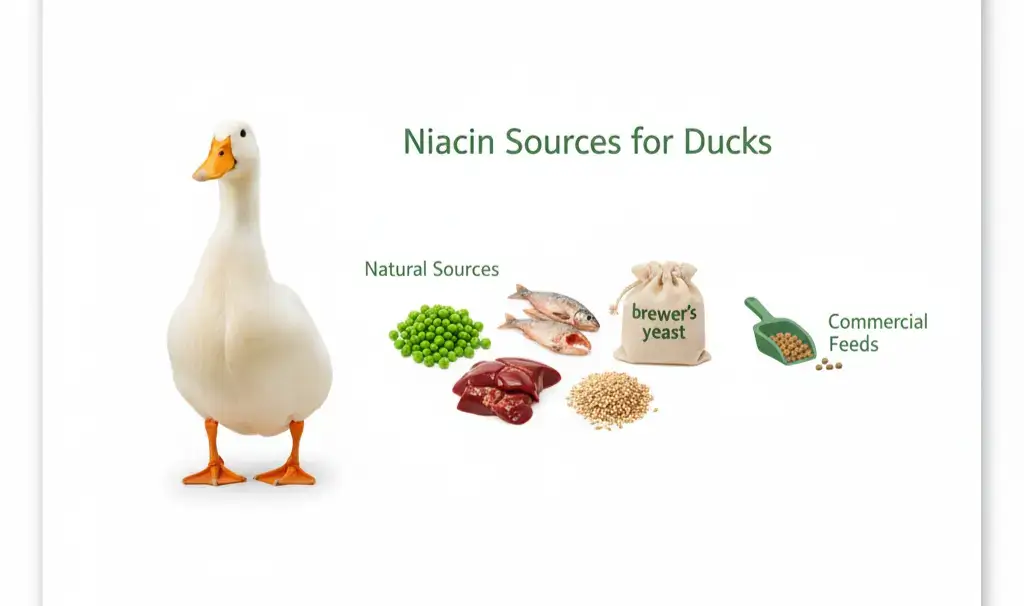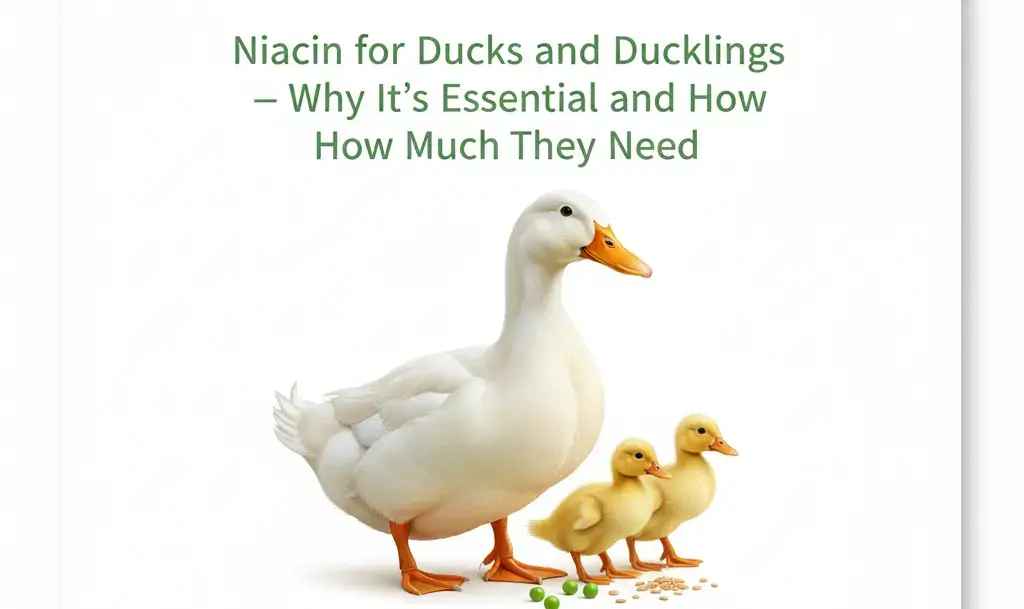If you’re raising ducks in your backyard, you’ve probably heard about niacin—but why does everyone make such a big deal out of it? Ducks, especially ducklings, have higher niacin needs than chickens. Without it, they can suffer serious leg and joint problems that affect their ability to walk, grow, and thrive. Let’s explore what niacin is, why it’s vital, and how to make sure your ducks get the right amount.
What Is Niacin?
Niacin, also known as vitamin B3, is a water-soluble vitamin that plays a key role in energy metabolism. It helps convert food into usable energy and supports healthy skin, digestion, and nervous system functions. Since niacin doesn’t stay stored in a duck’s body, it needs to be supplied daily through diet or supplements.
Why Ducks Need Niacin
Ducks grow fast—faster than most poultry species—and their developing legs and joints require strong bone and muscle support. Niacin helps in:
-
Building strong bones and joints
-
Promoting healthy feather growth
-
Supporting metabolism and brain function
Chickens can synthesize some niacin from the amino acid tryptophan, but ducks cannot do this efficiently. That’s why their feed must contain more niacin to keep them healthy.
How Niacin Supports Ducklings
Niacin is especially critical in the first 8 weeks of a duckling’s life. During this stage, their bones, legs, and muscles are developing rapidly. A lack of niacin can lead to:
-
Weak or bowed legs
-
Swollen joints
-
Inability to walk properly
Think of niacin as the “leg vitamin.” Without it, ducklings simply can’t stand tall—literally.
Also read: Bumblefoot in Ducks
Symptoms of Niacin Deficiency in Ducks

If your ducklings aren’t getting enough niacin, you’ll notice signs quickly. Look for:
-
Wobbly walking or sitting on their hocks
-
Swollen or twisted leg joints
-
Poor appetite
-
Stunted growth
-
Lethargy or weakness
Early intervention is key—once you see these signs, start supplementing niacin immediately.
How Much Niacin Do Ducks Need?
Here’s a quick breakdown of niacin requirements:
| Age | Niacin Needed per Pound of Feed |
|---|---|
| 0–3 weeks (ducklings) | 55 mg |
| 4–8 weeks | 35–45 mg |
| Adult ducks | 30 mg |
If you’re feeding a standard chicken starter feed, it may only contain about 35 mg per pound—not enough for ducks. Always check the label or add niacin supplements to make up the difference.
Also read: Why Is My Duck Coughing?
Niacin Sources for Ducks

Ducks can get niacin from both natural foods and commercial feeds.
Natural Sources:
-
Peas
-
Brewer’s yeast
-
Liver
-
Fish
-
Whole grains
Commercial Feeds:
Choose waterfowl starter or all-flock feeds labeled “for ducks” or “high in niacin.” These are specifically formulated to meet ducks’ nutritional needs.
Supplementing Niacin for Ducklings
If you suspect your feed lacks niacin, don’t panic—it’s easy to supplement.
Options include:
-
Brewer’s yeast: Add 2–3 tablespoons per cup of feed.
-
Niacin tablets: Crush and mix into feed or dissolve in drinking water.
-
Liquid niacin: Available at pet stores or online—ideal for precise dosing.
Avoid slow-release or flush-free niacin; these are for humans and don’t dissolve properly in water.
Can You Use Human Niacin for Ducks?
Yes—but only plain niacin (nicotinic acid) or niacinamide forms are safe. Avoid “no-flush” versions, as they’re ineffective for animals. If you use human tablets, calculate dosage carefully and dissolve them fully in water to prevent overdose.
Also read: Eye Infections in Ducks
Homemade Niacin Solutions
A quick DIY fix:
-
Dissolve 100 mg of niacin in 1 gallon of drinking water.
-
Offer this daily for ducklings showing signs of deficiency.
Always use unflavored, non-time-release niacin tablets. Replace the solution every day to ensure freshness.
Best Niacin-Rich Foods for Ducks
Here’s a list of duck-safe foods that naturally boost niacin intake:
| Food | Niacin Content (Approx.) |
|---|---|
| Brewer’s yeast | 40 mg per 100g |
| Peas | 2 mg per 100g |
| Tuna (cooked) | 22 mg per 100g |
| Chicken liver | 13 mg per 100g |
| Brown rice | 5 mg per 100g |
Feeding a mix of these foods once or twice a week can help maintain healthy niacin levels naturally.
Niacin in Duck Feed: What to Look For
When buying duck feed, always check:
-
Niacin level (should be listed as mg/lb)
-
Formulated for ducks or waterfowl
-
Balanced vitamins and minerals
Brands like Purina Duck Feed or Mazuri Waterfowl Starter include proper niacin levels, saving you from extra supplementation.
Common Mistakes When Feeding Ducks Niacin
Many new duck owners make these common mistakes:
-
Feeding only chicken starter feed without niacin supplement
-
Using flavored or slow-release niacin tablets
-
Ignoring early signs of leg weakness
-
Over-supplementing (can cause liver stress)
Always follow recommended dosages and observe your ducks’ behavior for any signs of imbalance.
Tips for Raising Healthy Ducklings
To raise strong, happy ducklings:
-
Use a waterfowl starter feed with 55 mg/lb niacin
-
Add brewer’s yeast to homemade feed
-
Ensure clean, fresh water daily
-
Provide space for walking and swimming to strengthen legs
Healthy nutrition + proper exercise = strong, sturdy ducks.
Conclusion
Niacin might seem like just another vitamin, but for ducks, it’s absolutely essential. It keeps their bones strong, their joints healthy, and their energy high. Whether you’re raising a small backyard flock or dozens of ducklings, always check your feed’s niacin content and supplement when necessary. A little extra care early on will save you from big problems later.
FAQs
1. Can ducks overdose on niacin?
Yes, excessive niacin can cause liver stress, but it’s rare. Stick to recommended doses.
2. How long should I supplement ducklings with niacin?
Continue supplementation until ducklings are about 8 weeks old.
3. What’s the easiest way to give niacin to ducks?
Adding brewer’s yeast to feed is the simplest and safest method.
4. Is chicken feed safe for ducks if I add niacin?
Yes—just ensure you supplement enough niacin (at least 20 mg extra per pound of feed).
5. Can adult ducks develop niacin deficiency?
It’s uncommon but possible if fed poor-quality grains or unbalanced diets. Always provide nutrient-rich feed.

Hello! I’m Ibrahim, the owner and writer of this blog. I run a chicken farm with 160 chickens, and I’ve gained a lot of knowledge about raising and caring for them. Now, I want to share my insights and experiences with you to help you in chicken keeping.

